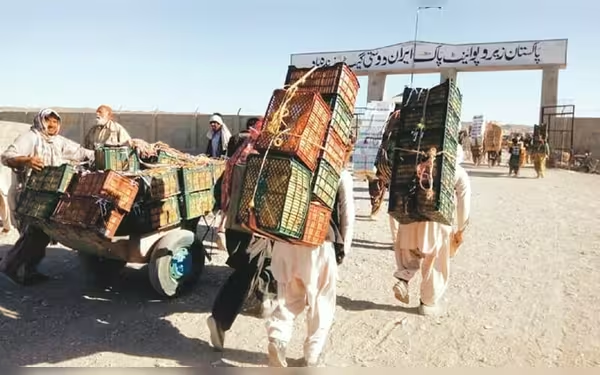Wednesday, January 15, 2025 04:50 PM
Traders Protest Pakistan-Iran Border Closure Impacting Economy
- Border trade restrictions threaten livelihoods in Balochistan.
- Protests highlight economic crisis in border towns.
- Call for government action to reopen trade routes.
 Image Credits: dawn
Image Credits: dawnTraders protest the closure of Pakistan-Iran border points, impacting livelihoods and economic stability in Balochistan.
In recent days, the closure of border points along the Pakistan-Iran border has sparked significant unrest among traders and residents in various border towns. This situation has arisen due to restrictions on border trade, which have severely impacted the supply of essential goods, particularly Iranian petroleum products, into Pakistan. The Rakhshan and Makran divisions, which rely heavily on this trade, are now facing a crisis that threatens the livelihoods of thousands.
On the streets of towns like Washuk, Panjgur, and Nokundi, a shutter-down strike was observed as the Rakhshan and Makran Border Trade Alliance called for a complete shutdown. This protest was aimed at highlighting the adverse effects of a three-day weekly halt in border trade and the restrictions imposed on oil transportation. With markets, hotels, banks, and other businesses closed, the economic activities in these areas have come to a standstill.
Residents in these border towns depend almost entirely on border trade for their income. With limited opportunities in agriculture and industry, the closure of trade points has left many families in dire straits. In Nokundi, for instance, the disruption of essential goods transport has added to the woes of both traders and residents. Trade union leaders have voiced their concerns, stating that security checkpoints have further complicated their situation, leading to delays and financial losses.
In Panjgur, trade leaders have condemned the border restrictions, emphasizing that generations of families have relied on this cross-border trade for their survival. Former Senate chairman and Balochistan Assembly member Mohammad Sadiq Sanjrani has also expressed his worries regarding the closure of trade points. He has urged the government to implement a modern regulatory system for border trade instead of imposing blanket closures. Sanjrani warned that such restrictions could push the youth towards anti-state elements, especially given the current economic challenges.
The importance of border trade cannot be overstated, particularly for the people living near the borders of Balochistan and Khyber Pakhtunkhwa. The ongoing closure of these trade routes has exacerbated poverty and despair in Balochistan, where the economy is already fragile and cannot withstand further unemployment and hardship.
Protesters have made it clear that they want the government to reconsider its decision on border trade. They are calling for the reopening of the borders and prioritizing the economic stability of Balochistan. Many view the closure as an economic "death sentence," urging authorities to support sustainable development rather than stifling the livelihoods of thousands.
The situation at the Pakistan-Iran border serves as a stark reminder of the delicate balance between security measures and economic stability. As the protests continue, it is crucial for the government to listen to the voices of the people and find a solution that not only addresses security concerns but also ensures the economic well-being of those who depend on border trade for their survival. The future of many families hangs in the balance, and it is imperative that their needs are met with urgency and compassion.













